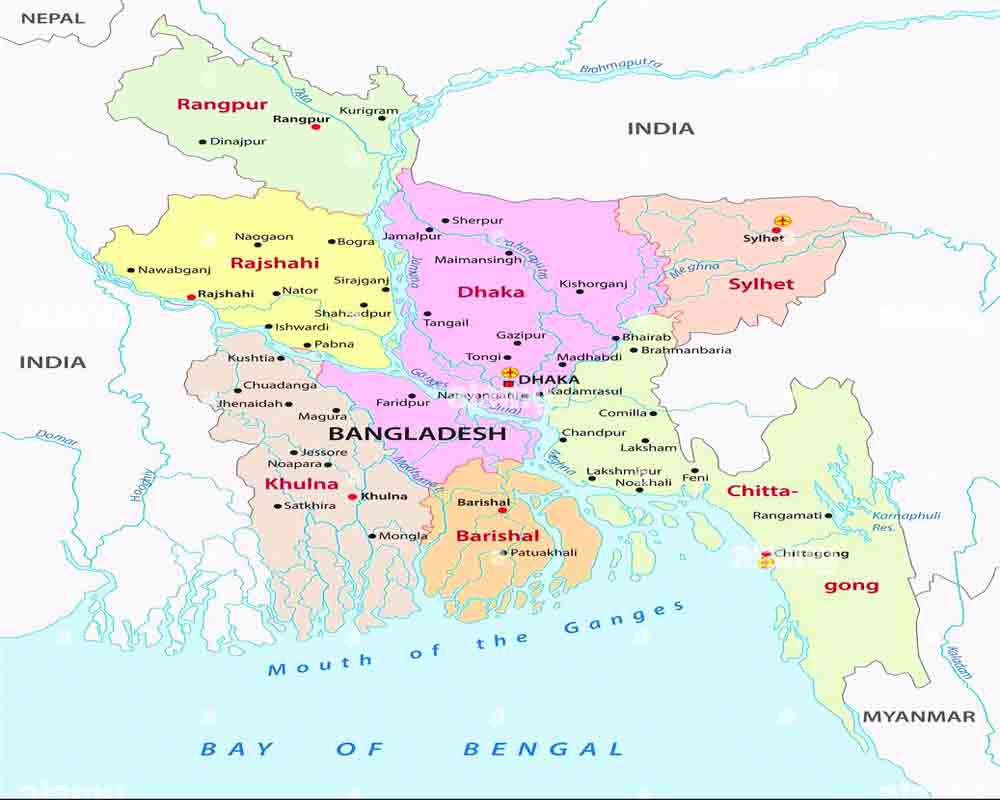All secular forces of the region, primarily India, must rally behind a beleaguered Bangladesh and help it fight the alien agenda
The existence of a radical Bangladesh in India's eastern flank-aided and abetted by the global Salafi movement-has always been a matter of great concern for India. Indeed, the lower extremities of Assam and the demographic jungles of the area have been a virtual "gateway" for Islamists from the erstwhile East Pakistan to travel to the economic hubs of the rest of India where-alongside the rabid fighters from Pakistan and thereabouts-they have been perpetrating terror in India. Indeed, one of the reasons why the Islamists inside Assam have not been engaging the security forces is because they do not want to attract their attention.
Furthermore, the crucial midpoint that Bangladesh stations itself between the Islamist hotspots of South Asia and South East Asia makes it both an ideal staging ground as well as a pullback area for Islamists of various hues. Therefore, it would not be altogether implausible to fathom that tanzeems, such as Jemaah Islamiyah of Indonesia and Lashkar-e-Toiba from Pakistan, have sought and found sanctuary In Bangladesh. However, while (as aforesaid) the primary reason could well be attributed to its strategic location and the existence of sufficient marshes and warrens in the country to house Islamists of all hues, the primary reason continues to be the fact that there is a huge constituency in the land of Bangabandhu that owes allegiance to the practitioners of puritanical Islam. Bangladesh, therefore, showcases itself as a unique case where geography, religion and socio-political dilemma meet to bewilder.
Bangladesh — despite the fact that it was formed on the basis of Bengali nationalism (jettisoning the commonality of religion that had linked it to Pakistan in 1947) — is not (in the opinion of the authors) a homogenous entity. In reality, there are two Bangladeshs. One is devoted to Bengali culture, language and the ethos that is the hallmark of Bengali-hood. Religion is not paramount for this group and indeed it is this group that seeks to keep the pennant of secularism alive. On the hand, the other formation identifies itself with the Islamic world and finds comfort in the "transformative moment" that Islam is passing through. The leadership of this group-which is rabidly anti-Indian-is divided, but is joining forces in order to keep secular Bangladesh's influence to a minimum.
The barrack politics of 1975 gave rise to the Bangladesh Nationalist Party. It is this party that heads the non-fundamentalist faction, and uses religion only as a means to achieve its political ends. The other factions in the non-secular configuration are fundamentalist and believe in Nizam-e-Mustafa. Parties such as Jamaat-e-Islami, Islamic Oikya Jote that is made up the razakars and the pro-Pakistani groupings during the anti-Bengali pogroms of the pre-liberation days are the primary constituents of this formation. Of late, other groups such as the Jama'atul Mujahideen Bangladesh have joined their ranks.
The Pakistanisation of the polity of Bangladesh is the primal threat to India, and stealth Pakistanis abound in the Bangladesh armed forces and intelligence services. While Pakistanisation does not necessarily mean Islamisation, the bitter truth is that forces of puritan Islam are ascertaining that the two are becoming interchangeable. Apart from the various aspects by which Bangladesh has subverted the security of the North East-aid to ULFA, NDFB, ATTF, NLFT, NSCN (IM) and the Islamists-the threat from Bangladesh in the future would be the Talibanisation that its anti-India agenda in tandem with the ISI is constructing for the North East.
As aforesaid, the demographic jungles of the lower Assam districts are already providing a concrete entry point for the Islamists of Afghanistan, Pakistan and South East Asia. As a matter of fact, with the Taliban takeover of Afghanistan, Islamists in the entire subcontinent received a shot in the arm and if reports are to be believed, the coming together of the al-Qaeda, Islamic State of Khorasan Province in their new found safe haven in the Af-Pak region has become a rallying point for the radicals from Kabul to Khulna.
In a recent news report paraphrasing the Chief Minister of Assam, it was stated that "a substantial number of youths from one particular religious community are missing and it is apprehended that at least some of them have joined terrorist outfits". Efforts, therefore, seem to be on to radicalise the youth of the state. Dar-ul-Aman, by most accounts, is within arm's reach for the proponents of Waliyah-e-Hind (Guardians of Hindustan).
But geostrategic bafflement of the sort that the return of the Taliban has achieved has not dissuaded many in Bangladesh from continuing to battle the forces of radicalisation. Indeed, it remains committed to the lofty ideals of Bengali nationalism that liberated it from the clutches of an exploitative western wing. As a matter of fact, despite the support it received from the anti-liberationist forces and presently from the wave of radicalisation, the majority in Bangladesh continues to be determined to defend the standards that have sought to negate Islam in its extreme form.
However, the waxing and waning character of an impetuous celestial body such as the moon is not only naturally ordained, but would invariably resurface at the slightest pretext. The fact that the present dispensation of Sheikh Hasina has sought to subdue radical Islam may not quite help it to completely eclipse the puritanical strain in Islam.
All secular forces of the region, primarily India, must rally behind a beleaguered Bangladesh and aid it fight the alien agenda. A course correction exercise, therefore, needs to be undertaken by India in order to thwart the multi-front war that is being readied by the adversary against its ally. Posterity would, otherwise, have only India to blame for what it would term as insouciance.
(Rami N Desai is an anthropologist and conflict analyst. Jaideep Saikia is a bestselling author and conflict analyst. The views expressed are personal.)


























